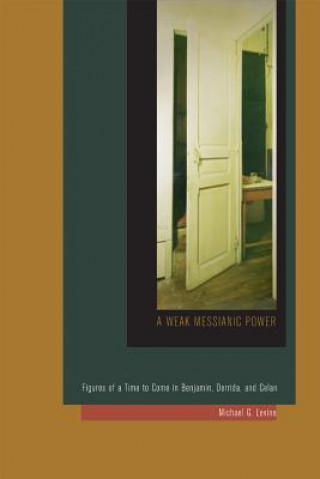
Kézbesítés
Vásárlási tanácsadó





Nem vált be? Semmi gond! Nálunk 30 napon belül visszaküldheti
 Ajándékutalvány
bármilyen értékben
Ajándékutalvány
bármilyen értékben
Ajándékutalvánnyal nem nyúlhat mellé. A megajándékozott az ajándékutalványért bármit választhat kínálatunkból.
Weak Messianic Power
 Angol
Angol
 103 b
103 b
30 nap a termék visszaküldésére
Ezt is ajánljuk


"We have been endowed with a weak Messianic power to which the past has a claim," Walter Benjamin writes in his famous theses on the philosophy of history. What is peculiar about this claim is that it addresses us not just from the past but from that which will have never belonged to it or will have belonged only as a missed possibility and unrealized potential. For Benjamin, as for Celan and Derrida, what will have remained unactualized is what remains with us, remaining not merely as a lingering echo but as a secretly insistent appeal. Because such appeals do not pass through normal channels of communication, because they are not transmitted via publically sanctioned, consciously recognized ways of speaking, they require a special attunement of the addressee, perhaps even a certain mode of unconscious receptivity. Levine examines the ways in which these forms of attunement are cultivated in Benjamin's philosophical, autobiographical, and photohistorical writings, Celan's poetry and poetological addresses, and Derrida's writings on Celan. The book argues that the appeal in question is linked to a very particular notion of the messianic, one Benjamin touches on at the very end of his theses when he suggests that the Messiah might enter through the strait gate of the second. Benjamin, Celan and Derrida all conceive of this second less as a positive moment in time than as a slight opening in it. All ask what role language - or rather a certain loss of linguistic control - may play in letting time open in this way.
Információ a könyvről
 Angol
Angol


 Kapcsolat
Kapcsolat Hogyan vásároljunk
Hogyan vásároljunk























